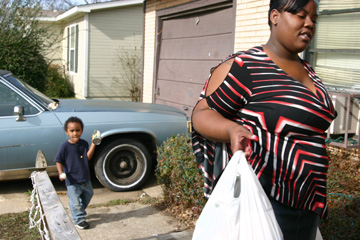 “That’s somebody else calling for some food,” she says, and picks up the phone to explain that the city’s oldest food bank is temporarily – or perhaps permanently – unable to help. She gets a dozen of these calls every day, and the number doubles around holidays. “This is the season where there was a lot going on down there,” she said. “Down there” is on Yuma Street, near the intersection of Riverside and Berry streets on the city’s Southeast Side, where hungry families have found assistance for more than 20 years from the Metroplex Food Bank, until the nonprofit organization self-destructed amid flawed management and bad fortune. And just when the food bank was struggling to get back on its feet under new leadership, the Internal Revenue Service delivered a fresh blow – a whopping $218,850 bill for back taxes, penalties, and interest, and a threat to seize the building and sell it.
“That’s somebody else calling for some food,” she says, and picks up the phone to explain that the city’s oldest food bank is temporarily – or perhaps permanently – unable to help. She gets a dozen of these calls every day, and the number doubles around holidays. “This is the season where there was a lot going on down there,” she said. “Down there” is on Yuma Street, near the intersection of Riverside and Berry streets on the city’s Southeast Side, where hungry families have found assistance for more than 20 years from the Metroplex Food Bank, until the nonprofit organization self-destructed amid flawed management and bad fortune. And just when the food bank was struggling to get back on its feet under new leadership, the Internal Revenue Service delivered a fresh blow – a whopping $218,850 bill for back taxes, penalties, and interest, and a threat to seize the building and sell it.
Payroll taxes went unpaid in 2004 and 2005 under former director Sharon Hogan, who was ousted by the agency’s board of directors after a Fort Worth Weekly article (“Crumbs in the Cupboard,” Nov. 9, 2005) revealed a litany of misdeeds and negligence. Problems began snowballing in 2002 after a fire burned a hole in the roof at the food bank’s 35,000-square-foot building. Repairs were slow, and rainwater leaked into the warehouse and ruined food. Later, health inspectors discovered moldy and thawing food in a faulty freezer and ordered 100,000 pounds of food to be destroyed. Hogan solicited donations to repair the building and to replace the freezer, but she soon stopped paying payroll taxes for the nonprofit’s employees, including her own salary and benefits that topped $100,000.
A health inspection in early July 2005 revealed numerous violations such as insects and feces in food items and ordered the destruction of another $100,000 worth of food. The inspector was set to return on July 11 to make sure the food had been destroyed. But that same morning another fire broke out, ruining the food and causing more damage to the building. The Fort Worth Fire Department blamed the fire on an overloaded electrical outlet. Hogan’s Waterloo was fast approaching. Health inspectors grew weary of her failure to fix problems and referred the case to the Texas attorney general’s office. The state threatened to take over the food bank and put it into receivership. Lee and other board members decided to close the building after the utilities were cut off for nonpayment, and they demanded Hogan’s resignation. She refused to resign, refused to be terminated, changed the locks on the doors, took mail, hid files, and continued to solicit donations that never made it to the food bank, Lee said.
 A third fire, on July 20, 2006, caused more damage and destroyed records. This time, investigators blamed arson. Lee eventually ousted Hogan and regained control of the food bank that has been an important part of the community since 1982, distributing food to churches, shelters, childcare centers, and families. Lee replaced Hogan with Regena Taylor, former president of the Tarrant Area Community of Churches. They’ve begun the slow process of raising money to pay for repairs. Bad publicity and a damaged reputation have made it harder to find donors, but Taylor and Lee have managed to get the roof fixed and to repair a broken door that was allowing vagrants easy access to the building, where they stole copper wiring and ruined the central air unit and bathroom fixtures. New members have been added to a board of directors that had previously allowed Hogan free rein despite her shortcomings. Lee remained as chairwoman, even though she agrees that she must shoulder some of the blame for the food bank’s problems. For too long, she and other board members allowed Hogan total control, even after the former director was obviously derelict in her duties. And Lee’s recent decisions might also be second-guessed. The food bank is supposed to pay $500 a month toward its tax bill, in an arrangement worked out with IRS officer Susan Day, but Lee skipped payments and applied the money toward repairs.
A third fire, on July 20, 2006, caused more damage and destroyed records. This time, investigators blamed arson. Lee eventually ousted Hogan and regained control of the food bank that has been an important part of the community since 1982, distributing food to churches, shelters, childcare centers, and families. Lee replaced Hogan with Regena Taylor, former president of the Tarrant Area Community of Churches. They’ve begun the slow process of raising money to pay for repairs. Bad publicity and a damaged reputation have made it harder to find donors, but Taylor and Lee have managed to get the roof fixed and to repair a broken door that was allowing vagrants easy access to the building, where they stole copper wiring and ruined the central air unit and bathroom fixtures. New members have been added to a board of directors that had previously allowed Hogan free rein despite her shortcomings. Lee remained as chairwoman, even though she agrees that she must shoulder some of the blame for the food bank’s problems. For too long, she and other board members allowed Hogan total control, even after the former director was obviously derelict in her duties. And Lee’s recent decisions might also be second-guessed. The food bank is supposed to pay $500 a month toward its tax bill, in an arrangement worked out with IRS officer Susan Day, but Lee skipped payments and applied the money toward repairs.
Day, who had shown patience in working with Taylor and Lee, responded with a threat to seize and sell the building.
“I think she got annoyed,” Taylor said. “We reneged. We made several payments, but we didn’t make them all.” The food bank’s attorney, Thomas Dunn, said Day had “apparently reached the end of her rope” when she made an unexpected visit to his office and said she would sell the building and apply the money toward the tax liability. She didn’t give a timeline for the seizure, but Dunn advised Lee and Taylor to hold an emergency board meeting to determine if there was any way to raise enough money to settle the tax bill, either through donations, loans, or taking out a mortgage. Day did not return phone calls for comment on this article.
Anyone who thinks Lee is going to roll over and play dead hasn’t met the unflappable 81-year-old activist. She is in full-tilt, food-bank-resurrecting mode, trying to get money for an independent audit so that corporate sponsors will once again feel comfortable in donating money to an organization that’s done little in recent years to warrant confidence. “I’ve been fighting uphill battles all of my life, so I don’t get bent out of shape over this one,” she said. “It’s going to work out; I believe that.” The food bank was feeding several hundred families a week during its heyday but can’t store or disperse any food currently. Still, Lee continues to load up food boxes and personally deliver them to more than 30 families each month. “There are so many people in this area that need it,” said Mary Hazard, whose large family welcomed Lee into their Eastside home in late December and gladly accepted the bread, cereal, canned vegetables, diapers, and other supplies she delivered. “This is a big help, a beautiful gesture.”
Whether the food bank will rise from the ashes depends on donors and their willingness to forgive previous indiscretions. Money and plenty of it will be needed to return the food bank to its fruitful days. Lee said she won’t give up, even if the IRS seizes and sells the building. The Tarrant Appraisal District currently has the building appraised at $764,342, although it probably would sell for much less at an IRS auction, considering the various damages from fires, floods, and vandals.
If the building is auctioned, the food bank has 180 days, under state law, to buy it back for the sale price plus 20 percent interest a year. Once an audit is done, donors might be more charitable, meaning the nonprofit could conceivably buy back the building, pay for renovations, and reopen. “We’ll get in there and power-wash that rascal down and put some paint in there, and, if we get those freezers back up and running, we’ll be back in business,” Lee said.










